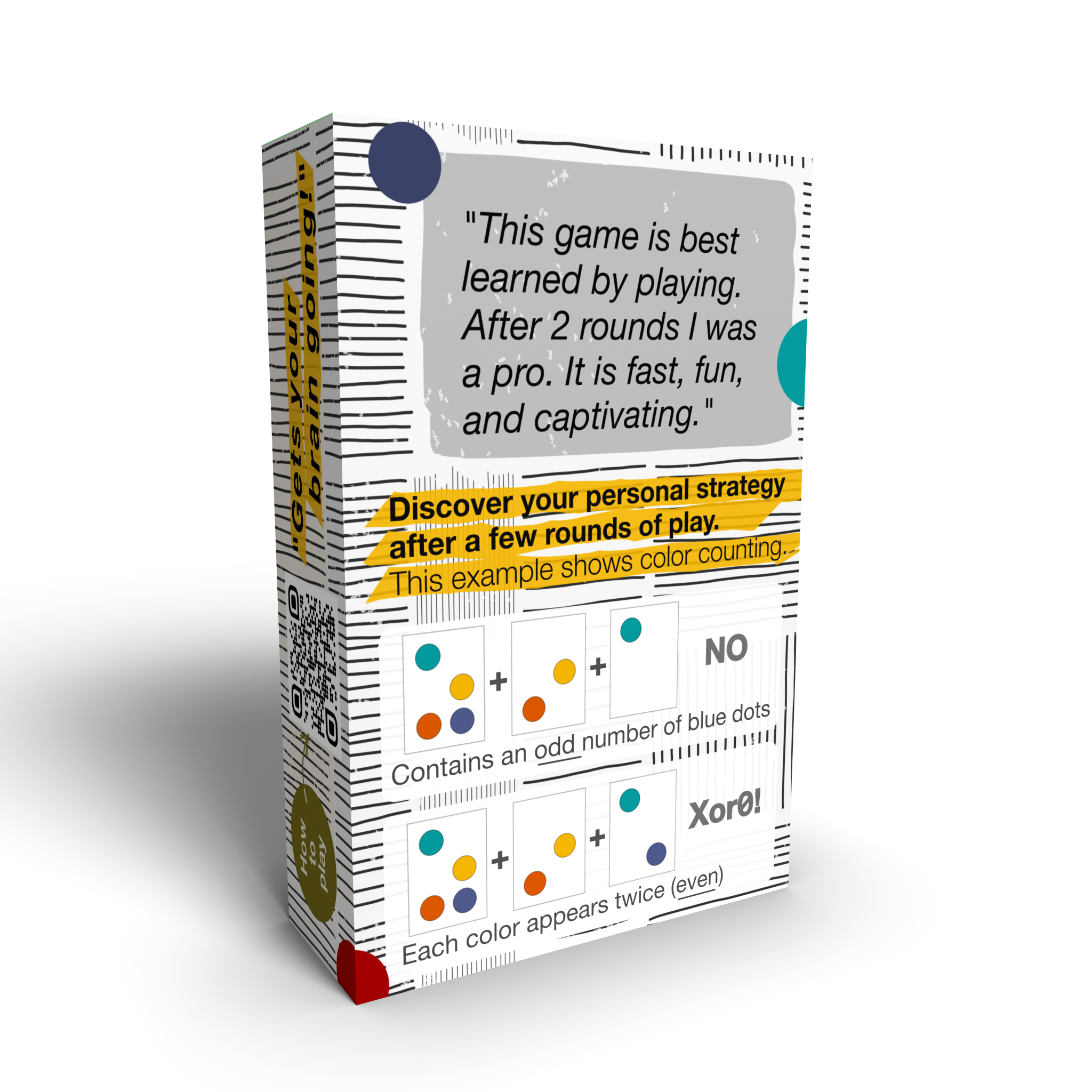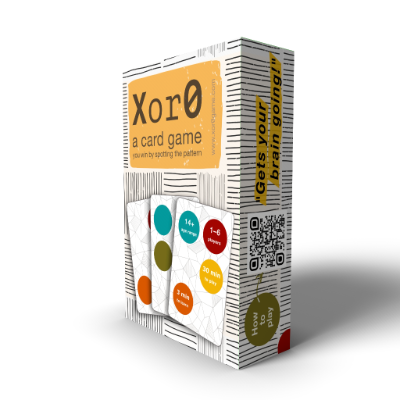Frequently Asked Questions
Gameplay
How do I find the Xoro Group?
There are many different ways to find the Xor0 group. During game testing the early versions of Xor0 we quickly realized that there are as many ways to think about the game as there are players. For some people it’s a spatial thing, others mentally rearrange the cards in their head, and yet others use strategies based on counting dots.
Try this strategy to get started: Two dots of the same color cancel each other. Find a group of cards where all dots get cancel each other.
Most people find the strategy that works for them after a few rounds of play.
What if there isn’t a Xor0 group among the cards on the table?
As long as you have the right number of cards on the table (based on the difficulty level you are playing), there is always a XOR0 group on the table.
I don’t see the Xor0 Group! What’s the Trick?
There is no “one simple trick” or a trick that works for everyone because every player thinks about the game in their own way.
Most importantly: Take your time! Especially when you play with the full deck and with 7 cards on the table, they can be hard to find. Sometimes it just takes five minutes or more to spot the Xor0 group.
Here are a few strategies to help you find a group when you are stuck:
First, look for any number/dot that exists only once on the table. The card with that number/dot can not be part of the group, because you would not be able to cancel out that number/dot. So you can ignore that card when looking for the group.
If there are no single numbers/dots, we like to start by looking for a number/dot that is only showing up twice. Can you build a set starting with these 2 cards? Take some time to think through all the options - a group may involve 2, 3,4,5,6 or even all 7 cards. If you cannot find a group with these two starter cards, that means you can ignore those cards, and focus on finding a group within the other 5 cards.
From here you could look for the next 2 dots that you could do the same exercise with and so on.
Still stuck? If all players agree, try rearranging the cards on the table—it’s surprisingly effective!
Is there always exactly one Xor0 group on the table?
No, there may be more than one! It’s not uncommon to have two sets on the table, occasionally there may be three.
Most of the time it’s best to claim the first Xor0 group you see because this lets you claim the cards before anyone else. However, it may be worth looking for other groups that contain more cards or more dots.
How is the winner of a round determined?
The game ends as soon as the last card is pulled from the deck. At this point, every player counts the number of cards they claimed during the round. The player with the most cards wins the round.
If two players have the same number of cards, the tie is broken by who has the most dots on the cards they collected.
If the tie still persists, count only 32 dots. Then only 16 dots. Then only 8 dots. And so on. Since it’s impossible for two players to have identical cards, this process will resolve the tie eventually.
Why does the game end when the last card is pulled?
And why not place the last card on the table and finish up? Placing that last card on the table will always result in a Xor0 set. (If it doesn’t, an invalid Xor0 group was taken earlier in the round.) Assuming every player knows this fact, it would be impossible to decide who wins the last Xor0 group. That’s why the game ends before this situation arises.
What is the meaning behind the numbers?
The numbers exist as a secondary identifier for the dots because colors just don’t work for everyone. If you can see colors well then it’s possible to completely ignore the numbers. That said, the numbers do have a meaning!
First, you probably already noticed that the numbers are powers of two. 32 is two times 16, 16 is two times 8, and so on. Hold that thought while we talk about binary numbers. A binary number consists of only ones and zeros, for example, 100110. Binary numbers are most commonly used in computer programming and electrical engineering.
To convert a binary number to a decimal number, you use Google. Or you multiply each digit by its corresponding power of two. In our example, it would look like this:
(1 x 32) + (0 x 16) + (0 x 8) + (1 x 4) + (1 x 2) + (0 x 1) = 32 + 4 + 2 = 38Just like we use plus and minus for decimal numbers, a common operation for binary numbers is the exclusive or, or short XOR. You can calculate the XOR operation by stepping through two numbers digit-by-digit and applying the following rules:
1 xor 1 = 0 0 xor 1 = 1 0 xor 1 = 1 0 xor 0 = 0For example, 100110 xor 001100 equals 101010. To calculate xor of three or more numbers, just work one pair at a time. Xor is commutative, which means that the order in which you xor numbers does not matter:
(A xor B) xor C = (B xor C) xor ANow imagine that each Xor0 playing card represents a binary number. Dots represent ones, missing dots are zeros. The number in each dot is the power of two you would use when converting the card’s binary number to decimal. If you calculate the XOR of all binary numbers in a Xor0 group of cards, then the result is zero. That’s where the game got its name: XOR Zero.
Do you have some examples Of Groups?
Absolutely! You can find 3 examples of the master difficulty on our instructions page. Some even have multiple possible groups you can identify.
Shipping
Where do you ship from?
We are in Salt Lake City in the USA. At the moment, all orders are fulfilled from our kitchen table and shipped from our local post office.
Do you ship to every country?
We would like to ship to everyone everywhere, but shipping internationally can be very expensive and full of surprises (usually the bad kind). That’s why we have only enabled shipping to the USA and Germany in our shop. For now, we will add other countries one by one.
If you would like to have a deck sent to your country, please send us a message. We will check the best shipping option and then set the country up in our online shop software.
Why is my preferred shipping option not available?
If you need a deck shipped really fast or with a specific carrier, please drop us a message. Right now we are trying to keep things simple and only support USPS First Class and Priority Mail in our shop.
Can I order more than one deck?
Yes, absolutely. Just enter the quantity you want on the checkout page. Be aware that we are only getting started and currently have very limited inventory from our initial test batch only. If you’d like to order more than 5 decks, please send us a message.
It looks like you are out of stock. When is the new batch coming in?
We currently run very small production runs to test the game and iterate on packaging and instructions to give you the best experience. If we are out of stock, please check back within a month, or sign up to our newsletter to hear the latest news and get notified when the next batch arrives.
CUSTOMER SUPPORT
Who can I message for support?
Message us at support@xor0game.com for any questions or comments on our game, gameplay, or shipping.
What is your return policy?
If you are not happy with your purchase, you may return the item(s) for a refund within 14 days of purchase. To be eligible for a return, the item must be unused and in the same condition as received. Shipping fees are non-refundable.
Email support@xor0game.com with details of your return. The shipping costs incurred for returning item(s) to Roundabout LLC for a refund will be at the customer's cost. Once the item has been returned to the store and evaluated by a staff member, you will receive a refund via your original payment method.
Once an order is shipped it is no longer our responsibility. Roundabout Corner LLC is not responsible for any stolen, lost, or damaged packages.
What currency can I pay in?
We only accept payments in US Dollars at this point.
Go here for our Terms and Conditions and here for our Privacy Policy.

About us
Roundabout Corner LLC is a fledgling game design company based in Salt Lake City, Utah. We are located at the corner of the roundabout.
Xor0 is our first game.


